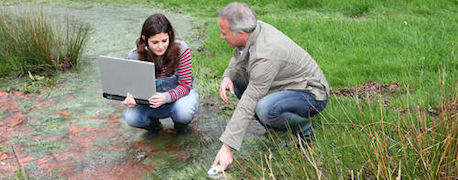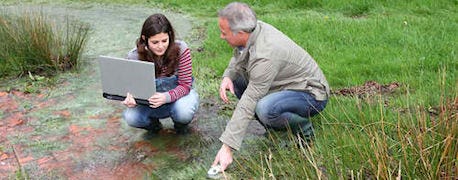
There were open ag teacher positions when the school year started in the fall of 2014 that were never filled. There were not many, and they weren't traditional programs, but there were some. And the only reason there weren't more is because a sizable portion of the new, first-year ag teachers who took ag teaching positions are what's called non-traditional teachers – they don't have a teaching degree.
Related: 40 Years is a Long Time to Teach Agriculture

Ag teacher shortage still looms in Indiana for at least the short term.
Indiana allows positions to be filled with people who qualify for emergency licenses if there are not enough applicants with ag education degrees to go around. Beth Theobold and Charity Keffaber, who are both working as consultants on a grant sponsored by the Indiana State Department of Agriculture to help mentor young teachers, say that a good number of the new teachers they work with don't have teaching degrees.
Some non-traditional ag teachers come out of industry. Some were trained in other fields in college and have an ag degree, but not a teaching certification. One young man returned to Indiana after a successful career in the horse industry, helping manage high-dollar farms that specialize in producing race horse prospects.
These individuals eventually either have to complete training courses in education or enroll in a Transition to Teaching program, which still typically involves education course work.
Related: Friend of Agriculture Ready to Retire After Long, Varied Career
Both Theobald and Keffaber say people outside of teaching filling the gaps have helped schools maintain ag programs that would otherwise have been without an instructor for the school year.
We see this as a good short-term fix. However, long-term, this may not solve the needs of ag education in Indiana.
Approximately 12 students, an unusually high number, completed student teaching and graduated in December. At least three of those are expected to teach yet this semester. But only seven student teachers are currently teaching under veteran teachers at high schools around the state.
That means a small crop of teachers available to meet demand this spring when schools may have openings for the 2015-2016 school year.
The mentoring process, funded by the ISDA grant, is a big step in the right direction. First-year teachers are less likely to get lost in the wilderness, and can stay connected more easily when both a mentor, either Theobald or Keffaber, and a coach, a veteran teacher, are assigned to them.
State officials recognize correctly that for a variety of reasons, fewer people are enrolling in ag education than are needed as teachers. More schools are looking to either start new programs or restart programs that were discontinued. That's the good news – administrators understand the value of ag education and FFA and what these programs can do for the development of both education and leadership skills for students.
Many students can find jobs in other fields that pay more. Others don't have extensive FFA backgrounds and aren't aware of the workload until they are immersed into the program.
Related: I blame the FFA for changes in rural youth
We're hopeful that putting veteran teachers together with new teachers one-on-one will help the new teachers survive the very tough first year. After all, I was a first-year teacher once. I technically don't teach today, but I hope the information I provide is instructive.
Indiana needs a new generation of ag enthusiasts, and that happens best if they become enthused by dedicated teachers during their high school years.
Here's to the dedicated men and women in the ag teaching profession, and here's hoping more young people join them!
About the Author(s)
You May Also Like




